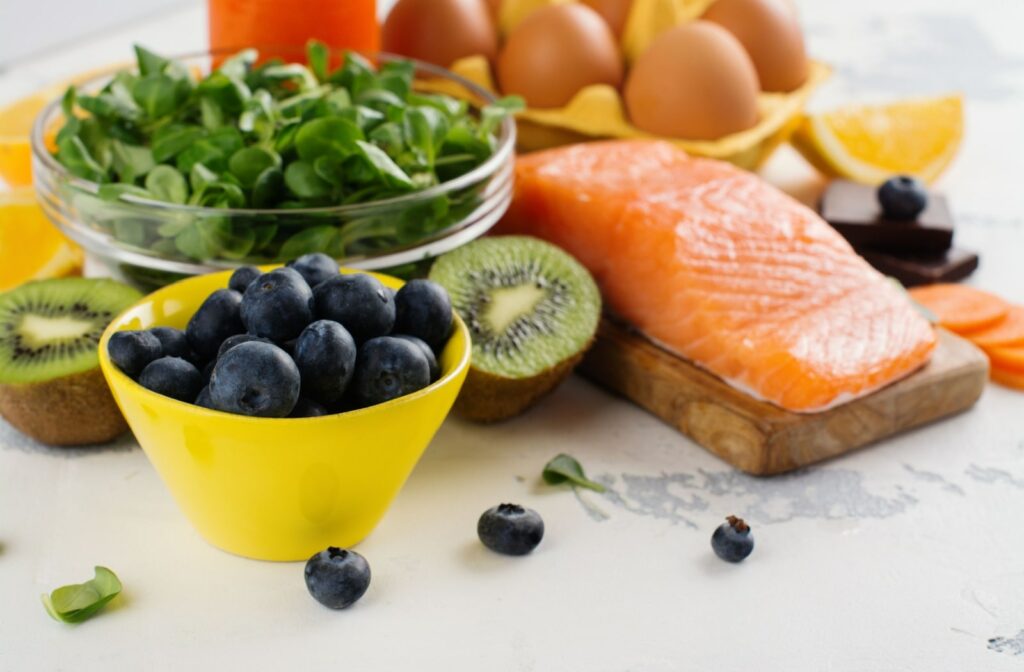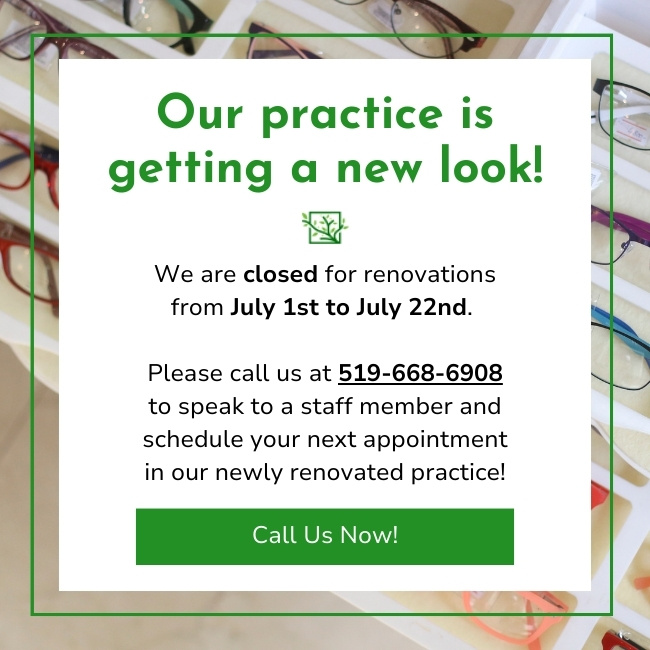Millions of people worldwide deal with regular dry eye symptoms. And dry eyes are more than just a nuisance—they can significantly impact quality of life. There are many different dry eye therapy options, but a non-medical treatment avenue in the quest for relief from dry eyes is nutrition. A balanced intake of vitamins—including vitamins A, C, E, and omega-3 fatty acids—can serve as a foundation for good overall health and the improvement of dry eyes.
It’s important to note that dry eye can be a complicated condition without an obvious cause or effective treatment. Lubricating eye drops and a balanced diet may be enough to relieve symptoms of the occasional case of dry eyes. Persistent cases may require a discussion with your eye doctor for a tailored treatment plan.
An Overview of Dry Eye & Vitamins
The feeling of grittiness and burning sensations that characterize dry eye can be due to a range of environmental, medical, and other factors. There isn’t a one-size-fits-all answer because the exact cause can be as varied as the symptoms that dry eye causes.
But why vitamins? Your eyes require a variety of nutrients to function optimally. Vitamins are micronutrients essential for normal bodily functions, and they also play a crucial role in maintaining eye health. This could be by supporting the structure and integrity of the ocular tissues, providing antioxidant protection, or even modulating the inflammatory response, all of which can be significant in the case of dry eyes.
Essential Vitamins for Eye Health
A few specific vitamins are known for improving overall eye health.
Vitamin A
Known for its role in maintaining a healthy immune system and cell growth, vitamin A is crucial for vision. More specifically, it helps improve the tear film, reducing the risk of eye infections and aiding in tear production maintenance.
One of its derivatives, retinol, is a key ingredient in the production of rhodopsin, the pigment in your eyes that operates in low-light conditions. Foods rich in vitamin A include liver, fish, milk, and eggs, but for those who need to avoid these sources, there are plenty of plant-based options such as sweet potatoes, spinach, and red bell peppers.
Vitamin C & E
Commonly associated with cold prevention, vitamin C is also a beneficial antioxidant that helps facilitate good eye health. It’s instrumental in collagen production, which is crucial for maintaining the health of the cornea and the eye’s tissue. Research specifically found that the oxidative protection that vitamin C provides can help improve the eye’s surface.
Many vegetables and fruits, especially citrus, strawberries, and tomatoes, contain decent amounts of vitamin C.
Vitamin E is another antioxidant that works with vitamin C to guard against damaging oxidative stress in the eye. And like vitamin C, it facilitates the production of collagen. Good sources of vitamin E include nuts, seeds, and vegetable oils.
Omega-3 Fatty Acids
Omega-3 fatty acids aren’t actually vitamins but deserve a spotlight due to their proven potential for aiding in the reduction of dry eye symptoms by improving tear production and decreasing inflammation. It’s important to note that more research is needed to confirm omega-3s as a treatment for all forms of dry eye.
Good sources of dietary omegas include fatty fish like salmon, mackerel, and trout.
Supplements for Dry Eyes
Supplements can be a convenient alternative to certain foods in some cases, especially if incorporating vitamin-rich foods into your diet isn’t feasible. Supplements that combine vitamins A, C, E, and omega-3 fatty acids could potentially provide a more concerted effort in tackling dry eye symptoms.
However, it’s crucial to consult an eye care professional before starting any new supplement regimen. They can help assess your needs and recommend the correct dosages.
Considerations to Keep in Mind
Look for supplements that adhere to standard quality and purity guidelines. Look for third-party certifications on the label, which can attest to the supplement’s safety and potency, easing the burden of worry that often surfaces in the supplement market.
It’s also crucial to make sure that any supplement you take doesn’t interfere with existing medications or health conditions. Your doctor can provide personalized advice.
Get Help in Your Battle Against Dry Eyes
The fight against dry eyes can be multifaceted, and the role of vitamins in this battle could be significant. Adjusting your diet or adding supplements can be steps in the right direction, but they are just part of the picture. Lifestyle changes and professional guidance round out a holistic approach to eye health.
Always remember that a personalized approach is best, so consult your eye doctor to chart the best course for your eye health. Call our team at White Oaks Optometry today to book an exam. One of our optometrists can discuss your symptoms and offer a tailored treatment plan to get you the relief you need.



